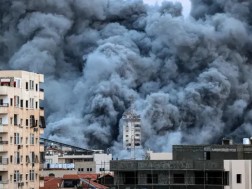Oil prices surged and US stock futures fell on Sunday night in their first reaction to Israel’s war with Hamas.
Although Israel is not a major oil producer, escalating tensions in the oil-rich Middle East spooked investors who have already been selling off oil in recent weeks.
Inflation, fear of a global economic downturn and a correction to prices that were surging in recent months have sent US oil prices down from around $95 a few weeks ago to just above $80 last week.
But on Sunday night, US oil prices surged 4% higher above $86 a barrel. Brent crude, the global benchmark, was also about 4% higher, trading around $88 a barrel.
Stephen Innes, managing partner of SPI Asset Management, said the surge was likely due to a tendency among traders to take “a buy-first-ask-questions-later response to Middle East geopolitical escalations.”
“Historical analysis suggests that oil prices tend to experience sustained gains after the Middle East crises,” he wrote in a note to clients Monday.
Israel formally declared war on Hamas on Sunday after the Islamist militant group launched its deadly surprise assault on Saturday.
More than 700 people have been killed in Israel, while more than 400 Palestinians have been killed, according to authorities.
In the equity markets, US stock futures, which surged Friday on a surprisingly strong American job market report, fell sharply Sunday night.
Dow futures were down 200 points, or 0.6%. S&P 500 futures were down 0.7%. And Nasdaq futures were 0.7% lower.
Global investors fear prolonged tensions in the Middle East could hurt the fragile global economic recovery.
In Asia, initial reaction amongst investors was mixed Monday morning.
In mainland China, the Shanghai Composite and Shenzhen Composite slipped 0.8% and 0.3%, respectively, shortly after they reopened after a holiday week. Meanwhile, Australia’s S&P/ASX 200 ticked up 0.5%.
Morning trade in Hong Kong was suspended due to a typhoon, while markets in Japan and South Korea were closed for holidays, CNN reports.
















